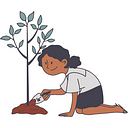The Family of Gift
A Simple Illustration of How the Gift Economy Works
“The meaning of life is to find your gift. The purpose of life is to give it away. — Pablo Picasso
Many times, people have a hard time understanding exactly how the Gift Economy works. The most fundamental way to understand how the Gift functions is to look at a strong family.
Of course, there are some dysfunctional families that do not operate as described below; in fact, we would have to admit that every family is a little bit wacky at times. But we could probably all agree on how a family is supposed to operate with emotionally healthy parents, children, grandparents, etc.
By seriously considering how a family with strong relationships functions, the process of the Gift becomes rather obvious.
The Parent-Child Relationship
Does a mother require her three year old child to work to pay for the food that he eats? Does a father require an eight year old to pay rent or utilities or for the ride to school every morning?
Of course not. Not only is it ridiculous to imagine this would actually happen, but there are few who would consider these requirements indicative of being a good parent.
Parents freely give these things to children. Why?
1. Because they love their children.
2. Because they have abilities, desires, and resources their children don’t have.
The reasons for a parent’s gift to a child really are that simple.
And how does the child most naturally respond? They feel a strong bond, an unbreakable connection, to that parent. Most of the time, for the rest of their lives.
It is the same for the Gift Economy.
The Child-Parent Relationship
As the child becomes an adult (after their temporary insanity during the teen years), how does the daughter behave toward her father? Does she abandon her dad when he becomes old and can no longer take care of himself?
If the relationship was merely built upon transactions, maybe yes. But if their bond was built through acts of love and kindness, of course the answer is no.
“Always give without remembering and always receive without forgetting” — Brian Tracy
This is the problem with our current economic situation using money. In monetary exchanges, the swap of currency for goods is almost entirely transactional and even downright competitive. There is very little relationship that is developed; therefore, trust between the parties is never strengthened and, many times, actually decreases during and after the transaction is completed.
This has become obvious through the passing of time:
As our trading among each other has become more transactional through the use of money, our relationships of love and trust have grown weaker and more hostile.
There is a strong correlation in the increased use of money and decreased feeling of community.
The Sibling Relationship
Let’s take an example among siblings in a strong familial relationship with one another.
Susan, the younger sister of Eric, is laid off from her job and unable to find work, although she is seeking employment. Fortunately, she owns her house already, but now she has no money to buy food for herself or her children this week.
If Eric really loves his sister, do you think he is going to let Susan and her children go without food?
Of course he won’t let that happen. If he has any way to help her, he will do it.
Even where money is involved, we see the same principle. If Susan needs a temporary loan of $200 to pay the electric bill and Eric has $200, do you think he would spot her a loan for a month or two until she can repay him?
It is almost certain that he would.
How about this? Do you think Eric would charge her interest on that $200?
Never.
Do you see how shallow it is for a bank or a government to say it really cares about its customers or citizens, but then charge them interest? That is completely dishonest, and everyone knows it on a personal level.
Do you think that, because he and his sister have such a great bond between them, Eric might possibly, maybe, conceivably, gift Susan the money and never ask for repayment of any kind?
And do you think Susan might remember that gift of love and reciprocate it the occasion presented itself?
You already know the answer.
All Relationships
We could go on and on, example after example. Husband, wife, extended family, our closest friends, Christmas, birthdays, etc.
The point is that…
… Everywhere two people want to share LIFE together, not merely commerce, the Gift is the method employed.
And THAT is how the Gift Economy works.
“The greatest achievement was at first and for a time a dream. The oak sleeps in the acorn; the bird waits in the egg; and in the highest vision of the soul a waking angel stirs. Dreams are the seedlings of realities.”
— James Allen
If you enjoyed this post and would like to help me and others, could you please do me a favor and click the “clapping hands” as many times as you can and also follow my publication? It helps the post to move up in the rankings in Medium and be seen by more people. Thanks!

